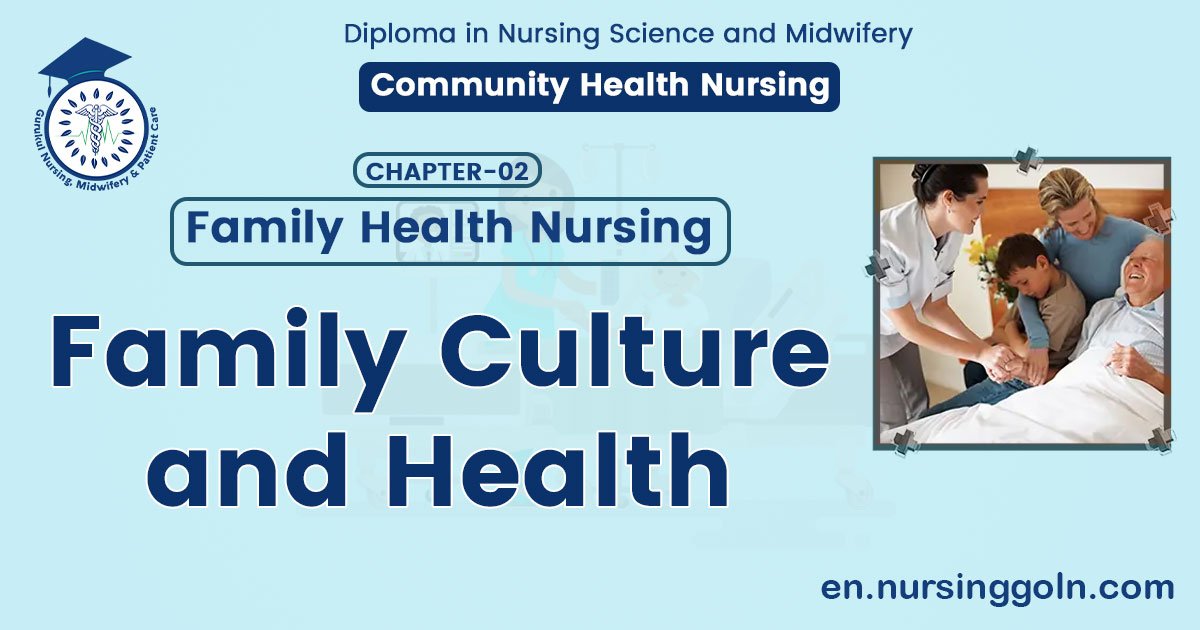Family Culture and health – This book covers the entire syllabus of “Community Health Nursing” prescribed by the Universities of Bangladesh- for Basic and diploma nursing students. We tried to accommodate latest information and topics.
This book is examination friendly setup according to the teachers’ lectures and examination’s questions. At the end of the book previous university questions are given. We hope in touch with the book students’ knowledge will be upgraded and flourished. The unique way of presentation may make your reading of the book a pleasurable experience.
Family Culture and health
Family Culture
Family Culture is the acquired knowledge that family members use to generate behaviors that influence family structure & function. The concept of family culture arises from a significant body of literature in the social & behavioral sciences of cross-cultural comparisons &in-depth analysis that demonstrate that each family has a “culture” that strongly influences its structure & function. Culture explains way families behave as they do. Family culture also gives the community health nurse a basis for assessing family health & designing appropriate interventions.

Three aspects of family culture
- Family members share certain value that affects family behavior.
- Certain roles are prescribed and defined for family members.
- A family’s culture determines its distribution and use of power.
Family health
Family health is concerned with how well the family functions together as a unit. It involves not only the health of each member & how they relate to other members, but also how well they relate to cope with the community outside the family.
Family health refers to a state of wellbeing in the physical, mental, emotional and social spheres as it applies to the family as a group or the individual members. Family health depends upon the family’s physical & social environment, its life- style & behavior, and satisfaction of its basic needs. Stanhope & Lancaster defines family healtir as “a dynamic chancing relative state of well-being which includes the biological, psychological, cultural and spiritual factors of the family system”.

Socio-economic status:
A family’s socio-economic status greatly affects all aspects of a Childs life including development, nutrition, and overall health & functioning. Low socio-economic status has the greatest adverse effect on health, and many children in this country live below the poverty level.
Socio-economic status has long been known to influence human health. Economic status of a community determines its purchasing power, standard of living, quality of life and family size as well as the adequacy of health services all of which directly influence the pattern of diseases and health status. Thus a community with a high per capita GNP is likely to have a better health status than one with a low GNP Interestingly enough, affluence may be an indirect predisposing factor for diseases like cancer, coronary heart disease, obesity, etc.
Socio-economic indicators:
- Rate of population increase.
- Per capita GNP.
- Level of unemployment.
- Dependency ratio.
- Literacy rates, especially female literacy rates.
- Family size.
- Housing- the number of persons per room.
- Per capita caloric availability Definition of family health
Spirituality and Religion
Spirituality
Stoll defines spirituality “as my being; my inner person. It is who I am unique and alive. My spirituality motivates me to choose meaningful relationships and pursuits. Through my spirituality I give and receive love; I respond to and appreciate God, other people, a sunset, a symphony and spring”
The term spiritual refers to a belief in higher power awareness of life &its meaning the centering of a person with purpose in life Spiritual does not necessarily mean following an organized religion, and those who are part of that surrounding environment. One can be spiritual yet not be a member of a recognized religious group.

Religion
Religion is an organized and public belief system of worship and practices that generally has a focus of a God or supernatural power. Religion generally offers an arrangement of symbols and rituals that are meaningful and understood by those who follow and participate in the beliefs and values of the religion. Often, there are rituals that mark significant events and passages in a person’s life, birth, adulthood, marriage, and death. However, being a member of a religious group doesn’t make someone spiritual.
Religious beliefs related to health care
The following are the major religious of the world a nurse manager should be attentive to the spiritual needs and customs of patients and their families in order to provide holistic nursing care
- Islam
- Hinduism
- Christianity.
- Buddhism
